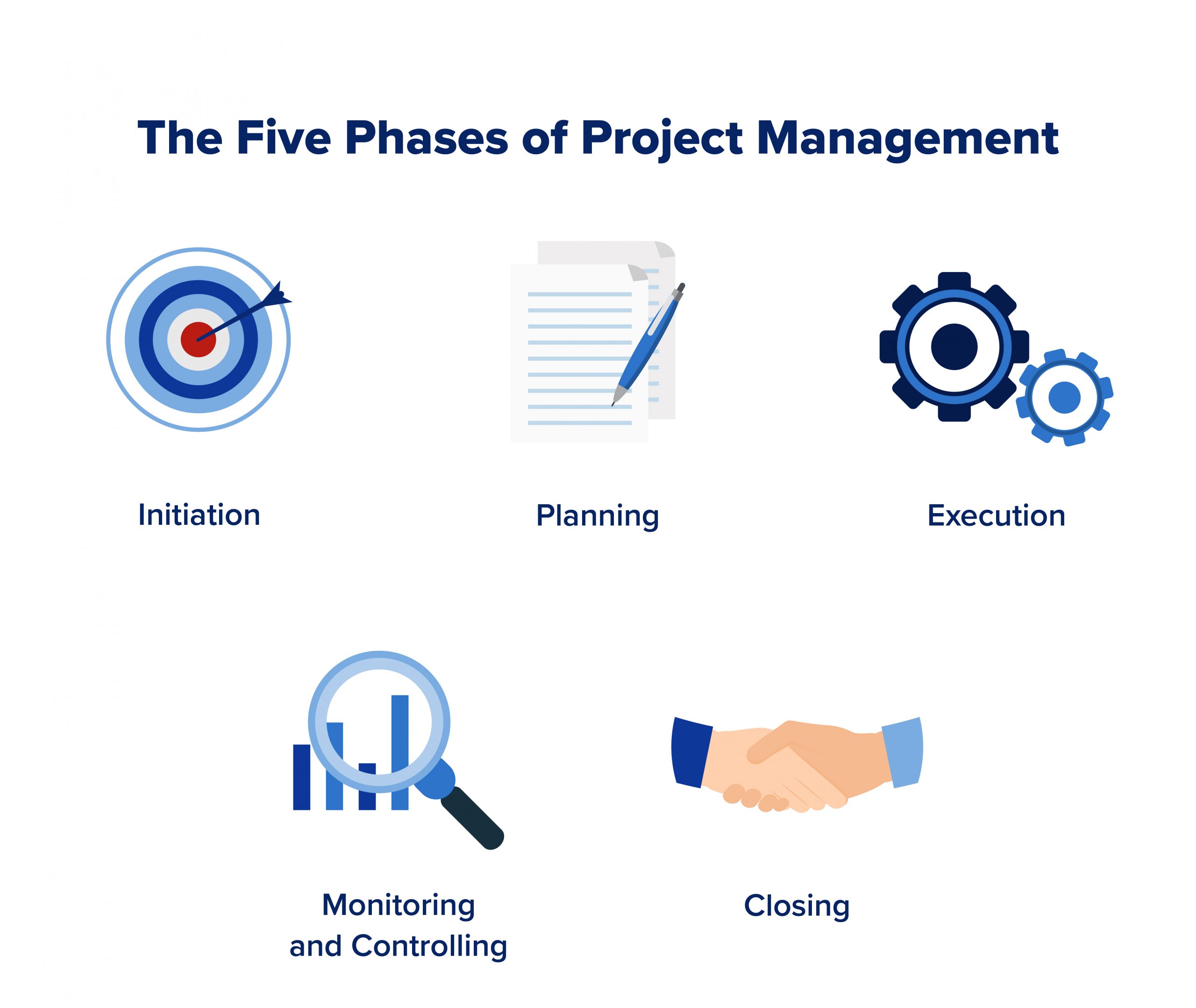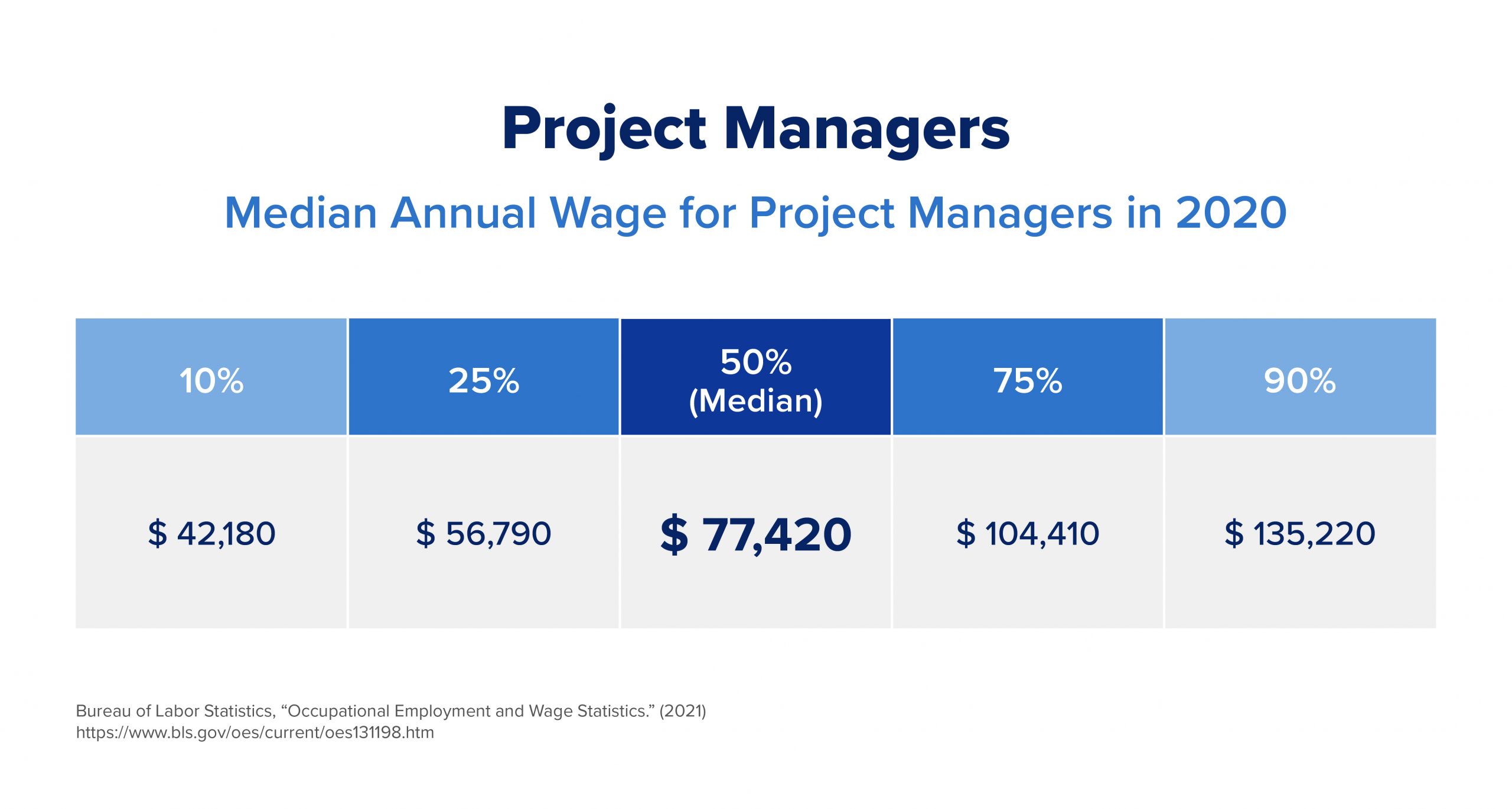Project management is a very specialized field, and the specifics of each project will differ based on the industry. In the following section, we’ll discuss project management across different sectors.
What Is a Technical Project Manager?
Technology is a critical component of how organizations manage their resources and grow over time. Most modern projects will involve some kind of technological component — understanding how to work in technical frameworks to achieve an organization’s objectives will be crucial to success in a tech project manager role.
Technical project managers should be well-versed in specialized topics, leadership principles, and project management methodologies. Despite their title, tech project managers can be involved in both tech-focused and non-tech-focused areas. They aren’t segmented into tech-specific organizations, rather, they work with projects that apply technology in various fields. For example, a technical project manager could integrate a new content management system (CMS) at a media company, update a website at a large enterprise organization, or integrate a new 3D modeling system at a construction firm. Technology is changing how organizations do business across many fields, and a technical project manager can be behind any number of these changes.
If you’re interested in becoming a tech project manager, Columbia Engineering Technology Project Management Boot Camp covers the fundamentals of software development, the project management life cycle, project management methodologies, and more throughout the 18-week online course.
What Is an IT Project Manager?
IT project managers are experienced information technology professionals who plan, execute, and close tech-focused projects. They’re typically responsible for supporting teams of technical specialists to build software, computer systems, or other pieces of software that can augment or completely change how a company operates. Projects might include software and app development, networking equipment upgrades, cloud computing integrations and rollouts, data management projects, and hardware installations and rollouts.
Becoming an IT project manager requires a robust set of fundamental technology and project management skills. Our guide on how to become an information technology project manager can help you learn how to get started on this career path.
What Is a Project Manager in Healthcare?
As the name suggests, project managers in a healthcare environment plan, monitor, and execute projects related to the healthcare industry. Projects could involve redesigning emergency room procedures to improve intake time or enhancing a hospital’s billing system to make the process smoother for everyone involved.
Healthcare project managers typically work on high-stakes projects that can have severe consequences if projects run over budget or over schedule, as issues can directly impact patients. Healthcare projects can be especially challenging due to the healthcare industry’s regulatory burden and privacy laws. Furthermore, the healthcare industry is constantly growing and changing, meaning that project managers must keep up to date with current industry practices.
While complicated, healthcare project management is a promising field that provides a dynamic, rewarding work environment. After all, successful projects can significantly impact people’s lives in this area.
What Is a Project Manager in HR?
Human resource departments oversee employee processes, company HR practices, training, benefits, onboarding, and more. HR project managers handle projects surrounding the internal operations of an organization.
For example, a quickly growing business might want to streamline its onboarding process to get new employees up to speed more quickly and efficiently. To accomplish this, an HR project manager would analyze the organization’s current process, work with existing departments to understand the organization’s pain points, and find ways to improve the process for new employees.
HR project managers are incredibly people-oriented, and the projects they undertake can have a significant impact on the livelihoods of an organization’s employees. HR projects can involve a significant amount of research and information-gathering from relevant internal stakeholders: interviewing existing employees and managers to determine pain points with processes, exit interviews with employees who are leaving the company, and feedback on changes from existing employees. Being able to connect with people and integrate their input is an essential skill for HR project managers.
What Is a Project Manager in Marketing?
Marketing campaigns are becoming more and more all-encompassing, with organizations expected to create large campaigns with a range of multimedia assets and other pieces of content. Marketing project managers specialize in planning, managing, and executing projects related to marketing campaigns.
Creating marketing campaigns requires a mix of strategic planning and creative execution across an organization or agency’s marketing team. Marketing departments can house teams of writers, graphic designers, marketing strategists, photographers, or other creative professionals — the project manager is tasked with interfacing with these teams and keeping the project on track throughout the process.
As with many other project management fields, marketing project managers are typically responsible for external vendor relationships. For example, if a company doesn’t have an in-house videography department, a project manager could interface with an external agency to produce creative assets for a campaign. Marketing project managers can build a diverse skill set of creative skills while also building a broad portfolio of projects.
What Is a Project Manager in Construction?
Compared with the roles listed above, construction project managers work in a more physical field. Whereas a marketing project manager might work through a digital design campaign, and a technical project manager oversees a tech-focused project, a construction project manager oversees the building of physical structures.
The fundamentals of construction project management are similar to other fields. Project managers in construction produce project planning documents for a building, allocate resources, build and manage construction teams, manage budgets, and troubleshoot issues along the way, and are usually responsible for the final build quality of the finished project. Construction projects can be complex, and a project manager has to interface with many vendors, equipment rental companies, and contractors throughout the process.
Construction project managers work on projects at various scales, from minor additions to existing buildings, to large-scale high-rise building developments. Positions exist within both private and public organizations. Public projects can involve roads, bridges, or other public structures. If you’re interested in learning more about projects in the public sector, the Federal Transit Administration’s most recent construction project management handbook has a wealth of information about the process.
What Is a Project Manager in Software?
Software project managers oversee and prioritize development tasks, working to bring a piece of software to completion. Project managers define the scope of projects, coordinate with internal and external resources, and execute a software project from conception to delivery. The software development process can involve front and back end developers, UX/UI designers, and business analysts. Understanding the many facets of the software development process is vital for project managers in software.
Most software projects have different life cycles from projects in other fields. While a construction project might take a linear path to completion, a software project can go through multiple rounds of testing, updating, and customer feedback. Handling phase four — managing and controlling — can be a significant component of most software-focused projects, as product teams integrate tests and user feedback. Software projects typically include an important post-launch maintenance component, requiring bug fixes and updates after launch to keep a piece of software up and running.

 Live Chat
Live Chat

